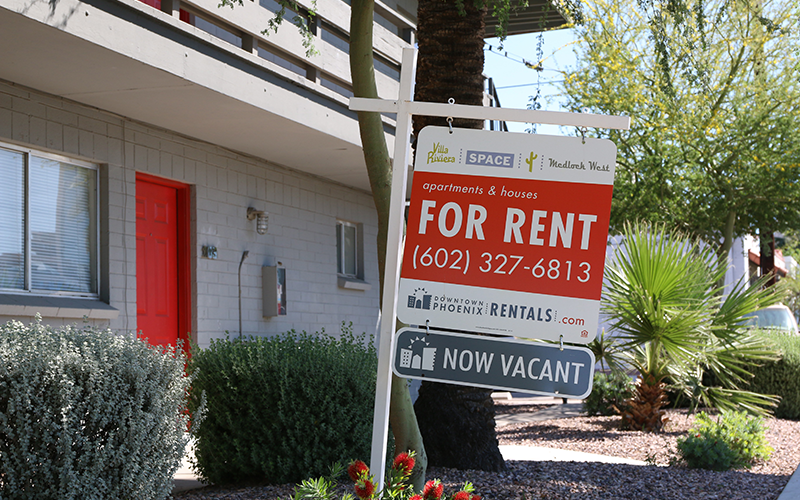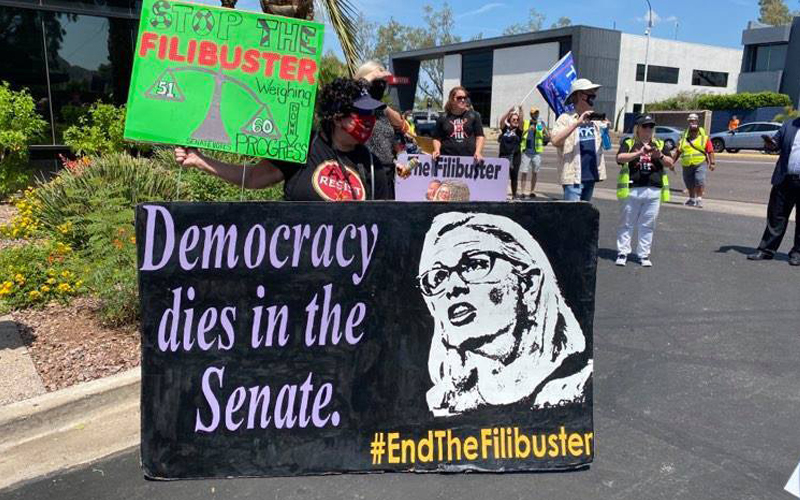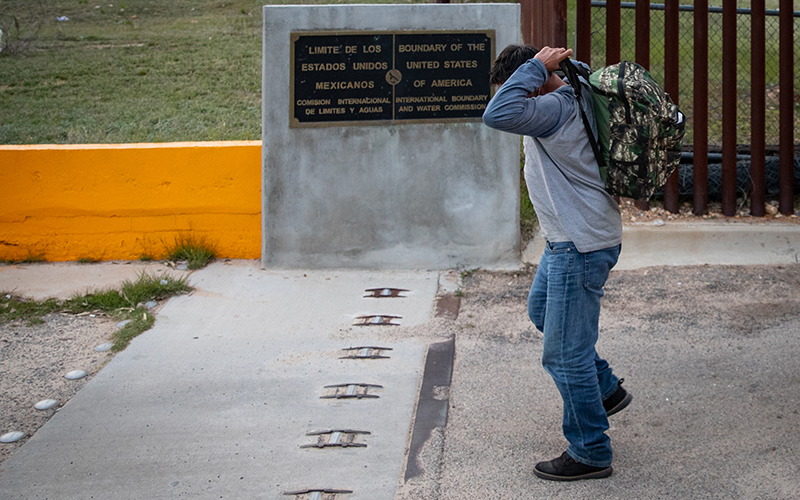
The U.S. Supreme Court late Thursday overturned a federal moratorium on evictions during the COVID-19 crisis, saying that the Centers for Disease Control and Prevention did not have the authority to impose such a rule. While some states have their own moratoriums, that is not the case in Arizona, where as many as 253,000 families may be behind on their rent. (File photo by Carolina Lopez/Cronkite News)
WASHINGTON – The Supreme Court’s decision to overturn a national eviction moratorium late Thursday comes as an estimated one-fifth of U.S. renters are behind on the rent – including 253,000 in Arizona.
Critics said the ruling could lead to an “eviction crisis” that will further the spread of COVID-19 as more people become homeless.
“While our country is in the midst of a dangerous surge of the COVID-19 pandemic, the fact this conservative Court would cast aside public health and green light the forced removal of families from their homes is appalling,” Rep. Ruben Gallego, D-Phoenix, said in a tweet Friday.
But a divided court said it “strains credulity” to believe that the Centers for Disease Control and Prevention had the “sweeping authority” to impose the moratorium under a 1940s-era public health law. Only Congress has that power, the court said.
The ruling comes as state and local officials have been scrambling to distribute federal aid to landlords and renters in amounts that one official said is “unlike any we’ve seen before.”
“In some cases, it allows for some to pay 12 months back and three months forward,” said Andy Flagg, the deputy director of community and workforce development for Pima County.
While his department had braced for the likelihood that courts would overturn the eviction moratorium, Flagg said Thursday’s decision was not anticipated.
“The timing was not necessarily expected,” he said.
The Center on Budget and Policy Priorities (CBPP), citing Census data, estimated that 11.4 million renters were at least one month behind on their rent this summer, including the estimated 253,000 in Arizona.
The state received $495 million in federal Emergency Rental Assistance funding, according to the Arizona Multihousing Association, but the money has been slow to reach the people who need it.
As of Friday, the Arizona Department of Economic Security said it had distributed $18.6 million in rental and utility assistance to 7,989 families in 12 counties in the state. Data from Maricopa, Pima and Yuma counties, who receive their share of the funding directly from the federal government, was not immediately available.
The CDC moratorium, first imposed last summer and renewed on Aug. 3, was designed to give landlords and renters “a little breathing room to figure it all out,” said Andrew Sugrue, assistant director of policy and advocacy at the Arizona Center for Economic Progress.
“It’s known that keeping people in their home avoids the spread and preventable deaths (from COVID-19),” Sugrue said.
But a group of Realtors from Alabama and Georgia challenged that justification in court, arguing that the CDC lacked the authority to impose the moratorium. A U.S. District judge agreed, but that ruling was put on hold by a federal appeals court in July.
The Supreme Court declined to intervene at that time, even though five justices agreed with the district court that the CDC had exceeded its authority. But one of the five, Justice Brett Kavanaugh, said the rule should be allowed to expire on July 31, as scheduled, to “allow for additional and more orderly distribution of congressionally appropriated rental assistance funds.”
He wrote that if a new moratorium was imposed, however, it would have to come from Congress – which has yet to happen.
The CDC, citing the spread of the highly contagious delta variant, issued a new moratorium on Aug. 3 that was applied only to counties with high rates of COVID-19 transmission.
That brought the case back to the Supreme Court, which said 6-3 that the district court’s ruling should stand and the moratorium should be overturned. The court said that except for “slightly narrowing the geographic scope, the new moratorium is indistinguishable from the old.”
Thursday’s decision brought renewed calls Friday for Congress to step in.
“The impending eviction crisis is a matter of public health & safety that demands urgent action by Congress,” Rep. Raul Grijalva, D-Tucson, said in a tweet Friday. “We must prevent further harm & loss of human life. We must extend the #EvictionMoratorium & states must quickly disperse federal rental assistance.”
White House press secretary Jen Psaki said that while Congress would have to approve another moratorium, the administration will “continue to look for ways to ease the burden and make it easier to get access to” rental relief funding.
“If there were enough votes to pass an eviction moratorium in Congress, it would have happened,” Psaki said. “What we’re looking at now is how to achieve the objective that we all share, which is to … keep people in their homes.”
She noted that Attorney General Merrick Garland, Treasurer Janet Yellen and Housing and Urban Development Secretary Marcia Fudge wrote Friday to governors, mayors and state courts, urging them to use Emergency Rental Assistance funding.
Psaki noted that seven states have their own moratoriums. But Arizona is not one of them.
Sugrue said it is “up to the legislature and governor to take action where they can,” but he is not optimistic.
“Without the governor and state legislature, I fear we’re going to remain where we are in terms of outreach, leaving it all up to the good graces of judges and landlords not to evict their tenants,” he said.
In the meantime, counties are doing what they can to ease the process of getting relief funds. Flagg said Pima County formed a team of caseworkers in June to walk renters and landlords through the application process, help them find a lawyer if needed and get cases restarted for those who had theirs delayed.
In the absence of a federal moratorium, Sugrue believes smaller municipalities should enact their own.
“It’s almost a stronger idea at the state and local levels,” he said. “We’ve seen it in states like Washington, New York, California, Illinois … even Austin, Texas’, state laws allow for them to enact one.
“People can’t stay safe if they’re not housed,” Sugrue said.



